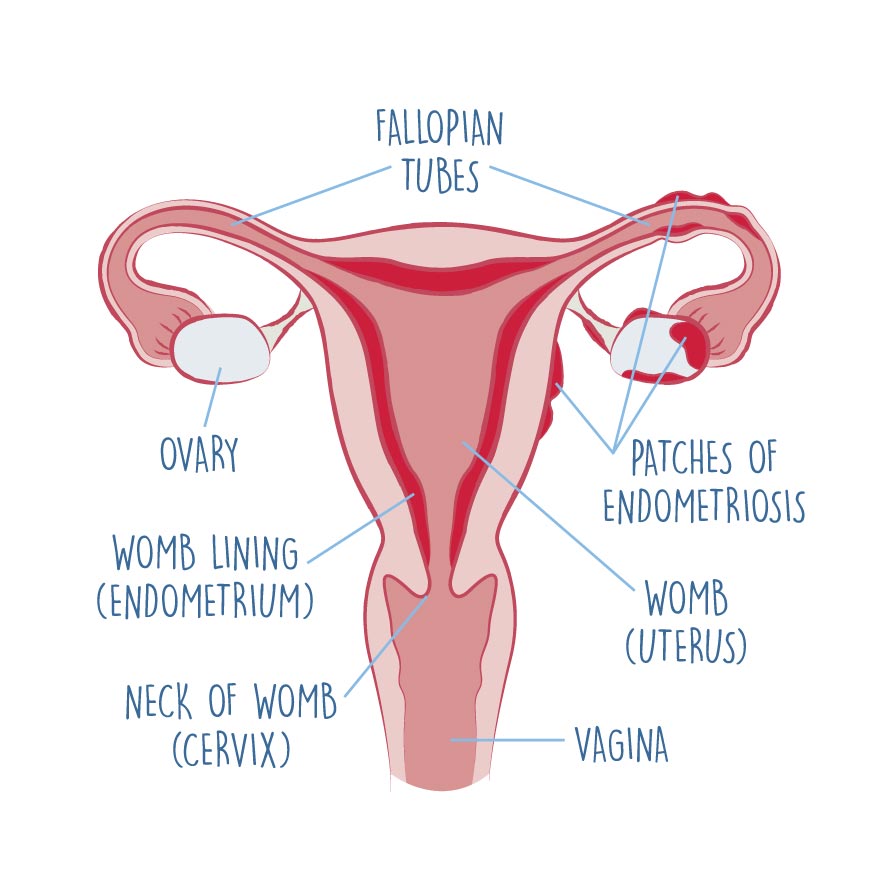Did you know that it’s estimated 10% of people with periods worldwide have endometriosis, yet it takes an average of 8 years to diagnose?
Part of the reason diagnosis can take so long is our lack of understanding of the condition, and our embarrassment and reluctance to complain at an OBGYN appointment when it comes to describing pain and symptoms that we experience below our waistlines.
The silence around our pain can stop us from receiving the correct treatment and improving our quality of life. So, it’s time to beat the stigma and get clued up on endometriosis.
What is endometriosis?
Endometriosis is a condition where cells that are similar to those in the lining of the womb are found outside of the womb, such as in the fallopian tubes or ovaries.

Over the course of your menstrual cycle, hormones cause your womb lining to grow, break down and exit your body when you bleed during your period.
Endometriosis cells react to these hormones in the same way except, due to their location, the blood has no way to escape your body. This causes internal bleeding, pain and heavy periods.
Endometriosis symptoms – what does it feel like?
To help you get diagnosed and treated faster, it’s important to know which symptoms you should be looking out for.
- Pain during and/or after sex
- Chronic pain in your lower stomach and back
- Heavier periods or debilitating period pains
- Pain when going to the toilet
- Feeling sick/constipation/diarrhea/fatigue
- Difficulty getting pregnant
The first thing you should do if you are experiencing symptoms of endometriosis is book an appointment with your GP. Symptoms are often likely to be worse when you’re on your period, so keep this in mind to help you catch them as early as possible.
Endometriosis and getting pregnant
If endometriosis is growing over the reproductive organs, it can cause problems with getting pregnant or infertility. It’s thought that half of people with endometriosis will have some difficulties when trying to get pregnant. If you’re struggling to get pregnant, you should talk to a doctor to see what may be stopping you.
Who can get endometriosis?
Endometriosis can affect any of us, at any age. This only makes it all the more important to be vigilant about any symptoms you may have.
While there are several theories, the cause of endometriosis is currently unknown, which means we can’t predict who will get endometriosis or pinpoint why somebody has it. Unfortunately, this also means there is no current prevention measure for endometriosis.
Natural symptom relief
There is currently no cure for endometriosis but there are several ways you can manage your symptoms naturally if they are making life harder for you.
- Book in with a physiotherapist who can develop a program of relaxation techniques and exercises to help reduce the pain you may be experiencing.
- Run yourself a nice, warm bath or grab a hot water bottle to target and reduce your pain with heat. This is especially great for your lower stomach and back area.
- If you feel like you can, some light exercise or doing yoga can help to ease period pains and make you feel generally brighter.
- Some food and drink might also help you to find symptom relief for your endometriosis. Omega 3 fatty acids and turmeric both help to reduce inflammation which can reduce pain, so try adding these to your diet. If you experience nausea from endometriosis, stick the kettle on and make yourself a ginger tea. This will help to settle your tummy.
- Endometriosis doesn’t always just affect your body, sometimes it can lead to feelings of isolation or depression, as many chronic conditions can. If endometriosis is making you feel low, there are a variety of support networks and helplines available to help you seek comfort.
- Sometimes the symptoms of endometriosis will be reduced after menopause. But, and there’s always a catch, this isn’t the case for all people.
Have you got endometriosis? Tell us what helps you to manage your symptoms












